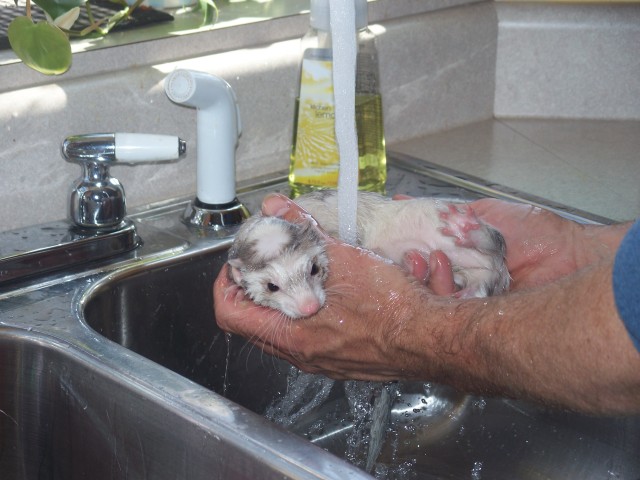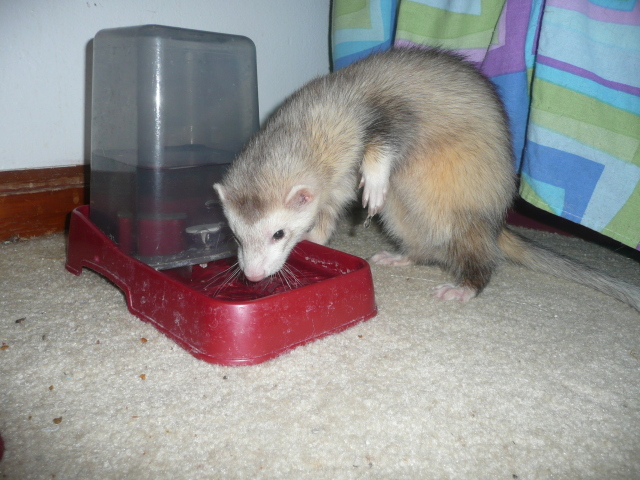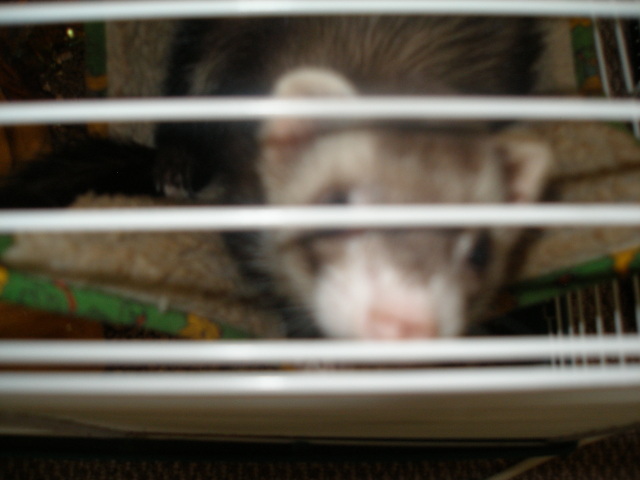QuestionRecently I noticed my 3 yr old ferret to be rather skinny. She's always been a little tiny, but never skinny - you can almost feel her spin! Then the next day I noticed she was losing hair on her belly. Then today I noticed a little more was missing on her upper back. Shes been energetic as normal and shes going to the bathroom just fine. I do notice her not eating as much and she use to and I'm not sure why. Her diet has been normal - I feed her the same brands I always have. I'm not sure if it is just the heat or if theres something wrong. For now, we put a fan on her to see if that helps and moved the location of her cage (her cage is near a lot of windows). But here in MA, we've had hotter summers than this year and never had any problems. I wont be able to get her to a vet til Tuesday - so I was wondering if you could help us figure out what is going on with her. Thank you
AnswerHello Jessica,
This sounds like some of the typical symptoms of adrenal disease. It is best to bring your ferret to your vet ASAP and promptly treated if she is diagnosed. Without treatment, Adrenal disease is 100% fatal, but with the proper medications and/or surgery, she can comfortably live years more.
Let me summarize the causes, risks and possible treatments to discuss with a doctor if she is diagnosed with Adreneal disease. This is for your information, so you can become familiar with the common symptoms, causes and treatment options. Even if she does not have adrenal disease, this is very useful to know, since it is extrememly common and if you own ferrets, you will see it eventually.
Symptoms: One of the major symptoms is hair loss or thinning that begins on the tail and/or back and works its way up toward the shoulders. This is a classic manifestation of the disease, and it seen in most cases. NOTE: The hair loss pattern may vary. Some other symptoms include swelling of the vulva (female false heat), thinning of the skin, a dry or brittle pelt, aggression (in males), weight loss and sometimes lethargy. Not every case of adrenal disease will present with all of the above symptoms.
Causes: Adrenal disease is caused by tumorous growths on one or both adrenal glands, which lie above each kidney. It causes an overabundance of hormones production, such as estrogen which is the major reason for the hair loss. Testosterone is also produced, which can lead to increased aggression in males. No one is certain what triggers adrenal disease, but some speculate that it is the overabundance of artificial light, early spay/neutering, diet, or genetics.
It is thought that the early spaying/neutering is a MAJOR cause since it is rarely seen in countries such as the UK which do not practice altering at a young age. One of my ferrets I purchased at a private breeder and neutered him at 8 months of age. The breeder has never seen a case of adrenal in her line, likely because she does NOT have them altered at 6 weeks of age as commercial breeders commonly practice. For These reasons I will not support Marshall Farms or large-scale facilities by purchasing their products or pets. I always adopt or obtain my ferrets from a knowledgeable breeder.
Treatment: Adrenal disease is 100% fatal IF untreated. The best method is either surgery to remove the affected gland(s) or, more commonly, medical management using a lupron implant that lasts up to 6 months. Treatment with lupron has the same life expectancy of up to several years, which is why it is now used more commonly than surgery. This implant will NOT stop the condition, but it will allow a longer, more comfortable life. Adrenal disease is VERY painful and if left untreated your ferret will die a terrible death and surgery is the ONLY cure.
NOTE: Ferrets with bilaterial or a tumor ONLY in their right adrenal gland have more complications since not as much gland can be removed due to the proximity of the descending vena cava. This is something to consider for the surgery option
Additional Information:
http://www.ferretcentral.org/faq/med/adrenal.html
http://www.ferret-universe.com/health/adrenal.asp
http://www.cypresskeep.com/Ferretfiles/Adrenal.htm
-Cindy P.

 Female Behavior Issues
QuestionQUESTION: I have had Ryoko, my female ferret, f
Female Behavior Issues
QuestionQUESTION: I have had Ryoko, my female ferret, f
 Concerns with Molly
Question
Molly when we firat go
Hello, I have a girl fe
Concerns with Molly
Question
Molly when we firat go
Hello, I have a girl fe
 Poisonous outdoor plants.
QuestionHi, Cindy. I had a question thats been spinning
Poisonous outdoor plants.
QuestionHi, Cindy. I had a question thats been spinning
 Ferret colors
Question
Mitch
Hello Cindy!
I have just adopted a new
Ferret colors
Question
Mitch
Hello Cindy!
I have just adopted a new
 ferret losing weight seems listless
Question
mario
Hello my daughters ferret is a neutered
ferret losing weight seems listless
Question
mario
Hello my daughters ferret is a neutered